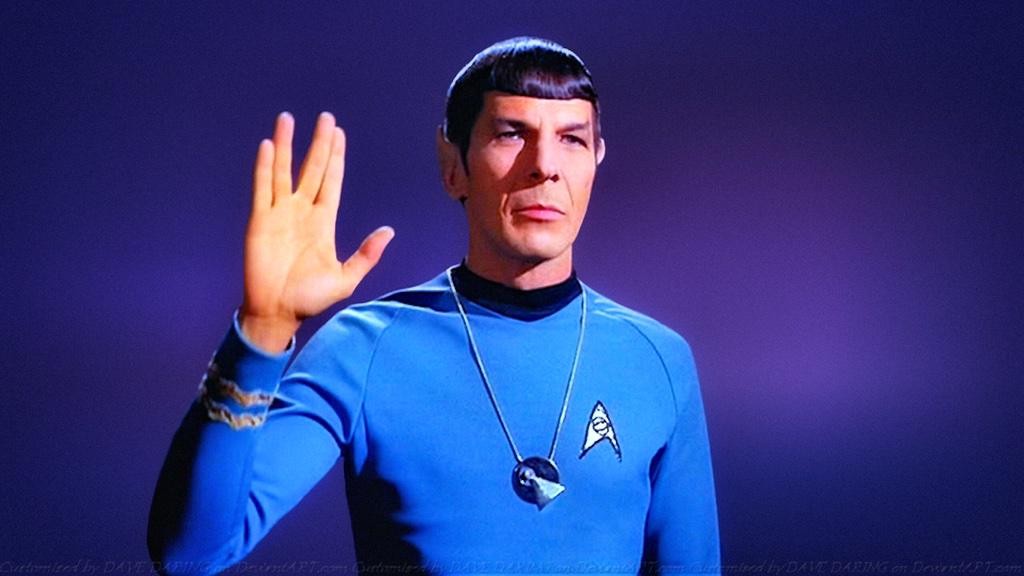This week, Leonard Nimoy, the actor famous above all other reasons for his role in the Star Trek franchise as Spock, passed away at 83 years of age from complications related to COPD. Like most if not all of you, I did not know the man, though by all reports and from his media presence, he seemed to be a good and decent human being. In a world full of human beings who aren’t, I would call that a life well lived on its own.
But, again like most of you, I did know his characters. We let them into our homes, let them tell us things about ourselves and about our world. Mister Spock spent more hours in my home than most of my relatives ever did, though perhaps that’s because my small branch of the family is an overseas transplant. So for a moment I’d like to focus on what Spock meant to me, as a stand-in for the man I never really knew, but whose absence will be felt by so many.
Spock was the alien on the crew. As a Vulcan — even though he was only half — logic was his shtick. When everyone around him was angry or prejudiced or illogical, he presented the facts and probabilities impartially. There was an episode I remember called “Balance of Terror,” which was the first time anyone had seen the Romulans or their cloaking device, and was basically an excuse for a Cold War analogy, complete with submarine(-style) warfare. It was a very good episode, perhaps one of the best of the original series, but what struck me was the dynamic between Spock and a bit-part named Stiles.
Stiles was a racist. I guess he was a speciesist, really. And since the Romulans and Vulcans shared a heritage in some distant colonial past, Stiles thought neither could be trusted. There was a moment in the show, however, when Stiles was in the briefing room with Kirk, Spock, and everyone else, and he interrupted to say they should take out the Romulans as fast as they could, at the same time throwing a dig at Spock:
STILES: These are Romulans! You run away from them and you guarantee war. They’ll be back. Not just one ship but with everything they’ve got. You know that, Mister Science Officer. You’re the expert on these people, always left out that one point. Why? I’m very interested in why.
But Spock, ever logical and unable to be baited, turned around and agreed with him, arguing with Bones:
MCCOY: War is never imperative, Mister Spock.
SPOCK: It is for them, Doctor. Vulcan, like Earth, had its aggressive colonising period. Savage, even by Earth standards. And if Romulans retain this martial philosophy, then weakness is something we dare not show.
By looking at the limited evidence — unprovoked attacks killing humans along the neutral zone with a cloaked ship, a history of violence shared with his own people — he came to a conclusion that agreed with the man in the room who disliked him the most. I know a politician or two who could learn a thing from Spock.
But more than that, Spock evolved along with the series. As much as I love the original series, I grew up on The Next Generation — Kirk, Spock, Bones, and Scotty were in the movies and in syndication, but it was Picard, Riker, Data, Worf, Troi — they were the ones with new episodes. But Spock was in the sequel, too.
There was a two-part episode — it got some of the highest ratings ST:TNG ever recorded — called “Unification.” Spock had gone undercover, by himself, on Romulus to try to meet with pacifists who wanted to negotiate a rapprochement with Vulcan and with the Federation. It all went south when it was discovered that the Romulan government was planning to use Spock’s message of peace in order to get past Vulcan security and stage an invasion, but at the end of the episode Spock chose to remain. Picard, of course, asked why, and this was the response:
SPOCK: The reason for my coming here has never been more clear, Captain. The union of the Romulan and Vulcan peoples will not be achieved by politics. Or by diplomacy. But it will be achieved. The answer has been here in front of us all the time. An inexorable evolution toward a Vulcan philosophy has already begun: Like the first Vulcans, these people are struggling to find a new enlightenment. It may take decades, centuries for them to reach it… but they will… and I must help.
Spock was half-human, too, and I’ve always wondered whether his decision to stay behind, despite his former understanding of what Romulans were like in general, was logical, or hopeful, or some combination of the two. And that’s one of the things I remember the most about him: his ability to walk that line. To be staggeringly logical and fallibly human, to reflect back to us in the audience our own potential as well as our own follies.
Spock was, above all other things, a scientist, balancing the evidence and his own human predilections against one another until he reached the best conclusion he could.
We could all learn a lot from him. A lot of us did.
***
Skeptical Tuesdays will return as usual next week.

